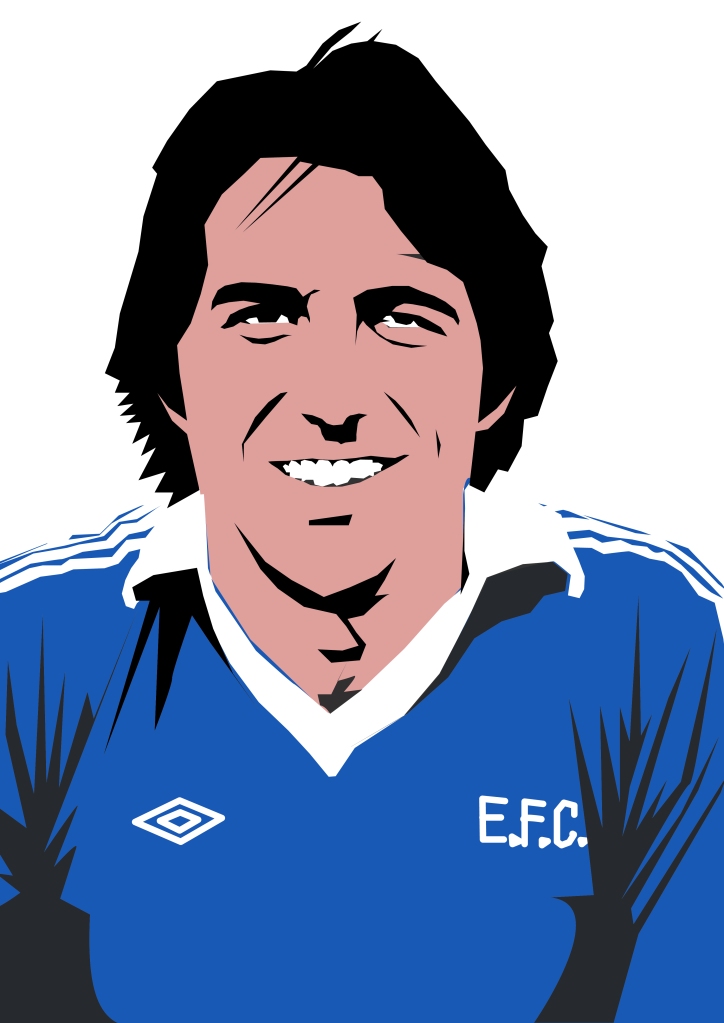
(289 games, 138 goals)
Amongst the cavalcade of forwards taken to the hearts of Evertonians, Bob Latchford has a special place.
‘At a time when we looked enviously across Stanley Park at the success that we had once thought was ours to take, a time when people would go into school and work and endure the daily smugness of Liverpudlians, a time when you felt so much in Liverpool’s shadow, Bob Latchford was something magical, a class player that Liverpool didn’t have. And that mattered’, says Brian Viner, author of Looking for the Toffees: In Search of the Heroes of Everton.
Latchford was born in Birmingham in 1951, into a family in which football was in the blood. His elder brother David became a goalkeeper at Birmingham City, while a younger brother, Peter, another goalkeeper, played for West Brom and Celtic.
But for Latchford, it was always about scoring not saving goals. After making waves at a junior level, he joined his brother at Birmingham, making his debut in March 1969, the 18-year-old Latchford scoring twice in a 3-1 win over Preston North End.
Despite that impressive start to life at St Andrew’s, he only made four further appearances that season and managed only ten more in the following campaign. But he prodded and pushed and slowly made himself a contender at Birmingham. And by the end of the 1970-71 season he had become a regular in the side, primed to launch himself at Division Two.
There, in the 1971-72 campaign, the football world first began to realise what he was capable of. His 23 League goals, helped the club secure promotion to the top flight for the first time in 32 years.
A continued eye for goal in the club’s first season up, caught the eye of a few top flight managers, including Everton’s boss at the time, Billy Bingham. With cash in the bank and in desperate need for a forward, Bingham came in with a bid. But Birmingham City (who were struggling to avoid relegation) were adamant that no amount of money could take him away. After plenty of back and forth, a compromise between Bingham and the Birmingham manager, Freddie Goodwin was eventually secured.
Birmingham would allow Latchford to leave if they could get a top-class midfielder and a defender in return. What this meant in reality was Howard Kendall and Archie Styles, plus £80,000 in a deal worth £350,000 – a British record fee at the time.
The deal had left Bingham with a tough choice to make. The need for a new striker at Everton was palpable. In the past two campaigns, the Blues had only a managed the meagre return of less than a goal a game. By the time the deal had been struck in February 1974, the return was only fractionally above that. But as much as Everton needed a forward, the sacrifice required was no small one. Although Styles was only a fringe presence, and not a promising one at that, by some margin Kendall had been Everton’s best player in recent years. Aged 28, he was still in his prime and as a one-time member of the beloved ‘Holy Trinity’, remained a crowd favourite.
Ultimately, Bingham had gone for goals. But, however understandable, the move did not go down well amongst the fans, causing outrage amongst Blues. The letters pages of the Liverpool Echo were inundated with complaints, illustrating how highly Kendall was still regarded amongst Evertonians.
It placed an extra level of expectation on the head of the new arrival, who was already feeling the pressure of that transfer fee, as he recently explained to The Football Pink in 2015:
‘I carried the burden until I got my first goal for the club. I didn’t score in my first two games for Everton, but then I opened my account against Leicester City and the great weight was lifted.’
And once he got going, Latchford kept at it. In his first full season he scored 17 league goals as Everton finished fourth, just three points behind champions Derby, having led the First Division into April.
‘We should have won the title,’ he later said ‘We had two really bad results against Carlisle, who finished bottom. We were 2-0 up at Goodison and lost 3-2 and they turned us over 3-0 away. If we’d beaten them twice, we’d have won the League by a point. That’s how close we came.’
First under Bingham and then under his successor, Gordon Lee, Latchford constantly provided the kind of firepower that could lift a side, giving it the realistic prospect of challenging for silverware.
‘He was great to watch,’ remembers Viner. ‘He didn’t score great goals, like bending free kicks or thirty-yard screamers. But he was big, strong and powerful and read the game superbly. He seemed to always be in the right place at the right time – a natural born goal scorer.’
But although they came close on several occasions, challenging for the title a number of times and losing the League Cup final in 1977, his life with Everton would never be marked by top-level success.
‘We qualified for Europe, we got to FA Cup semi-finals, we were competing for championships,’ he later said. ‘But it was dark days because we ended up coming short. And Liverpool were so dominant. If you took that Everton team and put it in the era we have now, the fans would be jumping for joy.’
And so, he had to make do with a different kind of glory, an achievement for which Evertonians, and those outside the club, still know him best for, the 30-goal season.
Ahead of the 1977/78 campaign, the Daily Express had offered a £10,000 prize (no small amount by the standards of the time) to the first player that scored 30 league goals in the First Division that season. Latchford, despite topping the Everton scoring charts three years in a row and bagging 17 league goals in the previous campaign, was not considered a favourite by the bookies.
‘I think us Blues gave him a better shot. We were playing good football and he seemed as decent a bet as anyone to reach that target first,’ remembers Dave Prentice, lifelong Blue and former Liverpool Echo writer.
Although his failure to get on the scoresheet in the first three games of the season might have dented any initial confidence, Latchford did eventually start to pick up goals.
‘He would go a few games without scoring and then bang in four against QPR or three against Coventry. So, just when you thought he might not do it, he’d suddenly and dramatically remind you just what he was capable of,’ continues Prentice.
Along with Everton’s more attack-minded football that season, which inevitably gave the club’s forwards more opportunities, Latchford also benefitted from the arrival in the summer of Dave Thomas from QPR.
‘Thomas was a fantastic winger and he could put a cross into the box on a sixpence,’ remembers Viner. ‘He was the perfect supplier for a forward like Latchford, someone who was so predatory in front of goal. The two of them seemed to understand each other, know exactly what the other had in mind. It was one of Gordon Lee’s better moves.’
Despite Latchford’s potency and Everton’s sparkling form, the 1977/78 season ended up being a frustrating one for Evertonians. A hoped-for title challenge had ultimately stuttered. As the run-in approached, the Blues had fallen off the pace. Although European football was secured, the fans were left with the lingering sense that the side could have done much more.
To make matters worse, Liverpool had once again reached the final of the European Cup, where they had the opportunity to defend their title against the unfancied Club Brugge.
‘The sole silver lining for us Blues was Latchford,’ argues Brian Viner. ‘As the season had closed he’d got closer and closer to the magic number. By the end, at a home game against Chelsea, he needed two goals to get himself over the finishing line. For Evertonians back then, him doing that would be our “title”, our “European Cup”. It was that important.’
On the day itself, Latchford recalls feeling pretty relaxed. ‘I was very calm all day,’ he recently told Toffee TV. ‘I woke up very calm, which is unusual as I always had a little bit of tension … but on that day, nothing. Just a total calm. I knew I was going to get the two goals.’
Although he might have been strangely relaxed, for those in the ground, it was a different story:
‘There was a palpable sense of tension in the air,’ recalls Dave Prentice. ‘You could feel it. 40,000 nervous fans crowded into Goodison on that Saturday afternoon to see if Everton’s number nine could reach that magical target.’
Everton made mincemeat of the Londoners that day, dominating them throughout. ‘We strolled to 2–0 lead within 15 minutes,’ continues Prentice, ‘and it could have been more. Chelsea were overwhelmed and Everton were magnificent. But the strange thing was, I don’t think anyone really cared about winning or losing. They had come to see Latchford score and so when Dobson and Wright got the opening goals, the crowd wasn’t that bothered.’
The scoreline remained the same until the 54th minute, when Neal Robinson, the 21-year-old rookie right-back, scored his first (and what would prove to be only) goal for the club.
‘You have to feel for him,’ says Brian Viner. ‘What should have been a glorious moment for the youngster was marred slightly by the muted reaction. By that point we were all starting to get a bit impatient and were even less interested in other players scoring than we had been at the start of the match!’
Although Everton were rampant, and Chelsea largely passive, as the minutes ticked along it looked to those watching as though Latchford might fall at the final hurdle.
‘We were just beginning to think it wasn’t to be,’ remembers Viner, ‘when Mick Buckley put a cross into the box and Latchford was able to get on the end of it to get his 29th. The noise from the crowd was incredible. You’d have thought it was a cup final or something.’
Mick Lyons added a fifth not long after, leaping in front of Latchford to head home from a corner. Everton’s stalwart centre-half then further tested the patience of Everton’s centre-forward when he got up top again, latched on to a loose ball and thundered a shot against the crossbar.
In an interview with the writer and Evertonian, Andreas Selliaas, Latchford revealed that his response to Lyons’s effort suggested that the pressure was finally getting to him:
‘Mick Lyons is the toughest player ever to play for Everton and I’ve never had a negative word to say against him, before or now. But the pressure was immense that day to get to 30, and when Mick hit the crossbar instead of passing, I shouted at him “Fuck off, Lyonsy, and stay in our half!”’
Luckily for Latchford, it was advice that his captain opted to ignore. ‘I think we were all starting to think it might never happen when fate intervened,’ remembers Viner.
Chelsea centre-half Micky Droy challenged Lyons in the box, and the Everton captain went to ground. In all honesty, it was a bit of a soft penalty, but it didn’t matter. The referee signalled to the spot and Goodison roared its approval.
It’s remarkable that nearly all of the goals Latchford had scored to that point had come from open play. Penalties were not usually his responsibility. But this opportunity wouldn’t be passed. There was only one man to take that spot kick. He duly stepped up to grasp his date with destiny.
Latchford took up the story in his autobiography, A Different Road: ‘Martin Dobson took me to one side while Chelsea began to protest. “Just keep your head down and blast it,” he whispered. I followed his advice. I thought about exactly where I wanted to put the ball – to Bonetti’s right-hand side. There were no nerves. The excitement cancelled out my fear and I was feeling numb. I was simply waiting for the whistle. This was my big chance. The ball left my right foot, I closed my eyes and then heard the Goodison roar. Elation. Relief. Satisfaction. I ran to the supporters and sunk to my knees. As fans ran on to the pitch, my team-mates ran towards me. The fairy tale was complete.’
It was not the greatest penalty that you’ll ever see, but it did the job. Everton were 6–0 up and Latchford had got his 30.
‘I think up to that point, that was my greatest moment as a Blue,’ says Brian Viner. ‘I had never experienced an atmosphere like it. The whole place was rocking. You have to appreciate how important that goal was. In a decade when so little had gone right for Everton, that was a moment to truly cherish. Bobby Latchford walked on water. And he was ours!’
In theory, that goal should have made Latchford considerably richer. But true to his self-effacing, modest style, he went home with less than £200, after sharing the sum between team-mates, ground-staff and charities.
‘The money side of the award is secondary to me’ he later said ‘The prestige and sense of achievement in reaching the record is the part that has thrilled me.’
Latchford would remain at Everton for a further few seasons; a key part of the Gordon Lee’s attempts to resurrect the club’s fortunes. As with Bingham before him, despite moments of promise, Lee was never able to succeed and lost his job in May 1981. He was replaced not long after by Howard Kendall, who joined from Blackburn Rovers where he had been turning heads as player/manager.
In a reverse of what had happened when Latchford had arrived at Goodison, when his signing had precipitated Kendall’s departure in 1974, so Kendall’s return seven years later acted as a prelude to his own exit, at a price of £125,000. Not that Kendall wanted him to leave, as Latchford revealed to The Football Pink:
‘It was my decision. I just felt that the club had started going backwards and I started to have doubts. I also had probably my worst injury in 1980-81. I damaged my hamstring in the November and then I didn’t play again until the final league game of the season and I think that, coupled with the fact that Graeme Sharp was coming through, made my decision for me. I went to Australia to play in the summer and I knew it was time for me to move on. Maybe if Howard had come in a couple of years earlier, I may have stayed at the club longer.’
By the time he left, his total of 106 goals made him the leading post-war goalscorer at the club, a record which stood until 1990 when it was surpassed by Graeme Sharp.
But it was time for a new chapter, and for Latchford that meant a move to Swansea City. The 30-year -old made his debut for them in the opening game of the 1981/82 season against Leeds United. In true Latchford style, he graced it with a hat-trick. And that was just the start as he kept up his remarkable goal-scoring record, powering the Swans to a creditable sixth in the League (having briefly topped the table earlier in the year).
The second season, however, was disastrous as financial difficulties beset the club. One by one, leading players left, with Latchford staying loyal as long as possible. His consolation goal at Old Trafford in May 1983 was to be Swansea’s last in the top flight for 28 years. Following relegation, he played a further 18 games before he too had to move on.
Over the next two seasons, with the years beginning to tell, he turned out for NAC Breda of Holland (13 goals in 16 appearances), Coventry City and Lincoln City before returning to South Wales for spells at Newport County and Merthyr Tydfil. Finally, he retired in July 1987, following a career of 546 games with 231 goals.
Never keen on a career in management, Latchford went into business on retirement. He ran a children’s clothes company and then a sports agency, before taking on a marketing role at Ladbrokes in the two years leading up to Euro 96.
This latter role led Latchford briefly back into football. His old Birmingham City teammate, Trevor Francis had become the club’s manager and asked him to help set up the youth academy there.
He eventually left Birmingham in 2001 to start a ‘new life’ in Austria with his new wife, Andrea. Today he lives in Germany, just one of the wide Blue diaspora that spans the globe. Despite his Midlands roots and the wide and varied football journey his career took, his heart remains at Everton. As he told James Corbett back in 2006, while working on his autobiography; ‘I might have started at Birmingham, but my soul is at Goodison.’
You can buy Everton Number 9 Retro gear at – https://www.etsy.com/shop/EvertonThat

